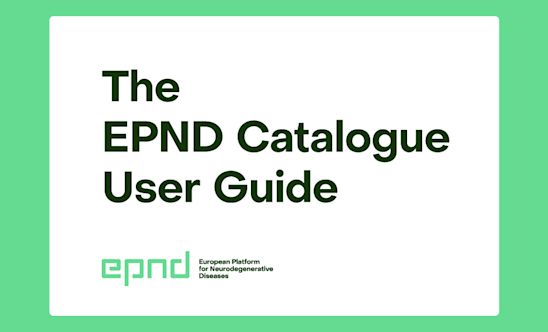EPND Catalogue User Guide
03/07/2024

EPND Catalogue User Guide
Here you will find information and user guides to make your studies, datasets, and biosample collection information discoverable on the EPND Catalogue. You will also find frequently asked questions about the EPND Catalogue.
User Guides:
How to Register or Login and Add Your Studies
How to Register or Login and Update Existing Studies
How to Add Dataset and Biosample Information to Your Studies
EPND Catalogue FAQ’s
Why do I need two-factor authentication to login?
Two-factor authentication allows us to best protect the valuable user and study information submitted to the EPND Catalogue. It also allows us to ensure that study administrators receive authentic and genuine requests for information.
What is the EPND Catalogue?
The EPND Catalogue is a first-of-its-kind, open, and accessible database enabling discoverability and access to more than 75 neurodegenerative disease cohorts from 17 European countries. The EPND Catalogue includes a wealth of metadata, covering 13 disease areas with more than 240,000 research participants. The EPND Catalogue enables researchers to discover information about datasets and biosamples from European cohorts, maximizing progress in developing new diagnostics, treatments, and biomarkers.
What’s new in the EPND Catalogue?
We’re regularly improving and updating the Catalogue to increase the visibility and discoverability of studies. The enhanced EPND Catalogue, launched in March 2024, now includes enhanced study details and search functionality.
Make your studies discoverable on the EPND Catalogue to increase your potential for research collaborations or citations of datasets, paid access to biosample collections, and opportunities for collaborative grants. Users can also provide additional study information, including metadata, datasets, biosamples, and use conditions to increase the potential for discoverability and utilisation of invaluable data and samples.
What neurodegenerative diseases are included in EPND?
The EPND Catalogue enables discovery of studies, datasets and biosample collections for all neurodegenerative diseases, from highly prevalent disorders such as Alzheimer’s and Parkinson’s to rarer diseases like multiple system atrophy and Huntington’s disease.
How can data or biosamples collected in a clinical study be shared via EPND?
See the user guide: How to Add Dataset and Biosample Information to Your Study to learn how to make your research discoverable.
What is the Alzheimer's Disease Data Initiative? What is the AD Workbench?
The Alzheimer's Disease Data Initiative is a US-based medical research organisation dedicated to advancing scientific breakthroughs in treating Alzheimer’s disease and related dementias through open data and global collaborations.
The AD Workbench is an online tool from the AD Data Initiative that makes it possible for researchers around the world to share data, resources, and tools. It is open, global, free, and easy to use. The AD Workbench powers EPND’s platform, which hosts a community of practice for neurodegenerative disease research in Europe.